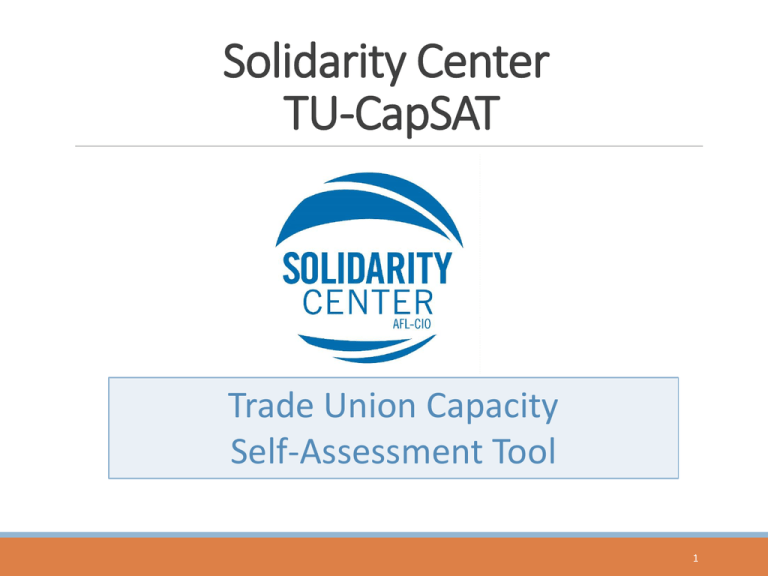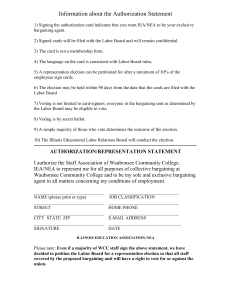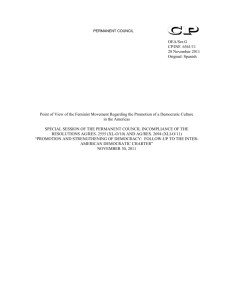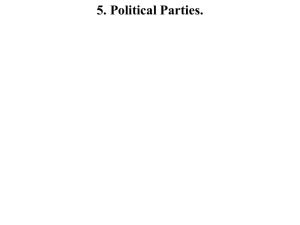Solidarity Center presentation on OCA
advertisement

Solidarity Center TU-CapSAT Trade Union Capacity Self-Assessment Tool 1 “I see the same training after training, year after year. Why are you repeatedly doing the same trainings with the same organizations?...” 2 “Show me evidence that you know your training resulted in increased organizational capacity and sustainability for your partners…..” 3 Evaluating Trade Union Organizational Capacity Tool Requirements… Matches SC programming (training, mentoring, technical assistance for trade unions) Can measure progress (positive change) Simple to use Informs funder and SC 4 What it is NOT NOT a Report Card on partners NOT a Report Card on SC field offices NOT sent to funder ◦ Scores and justification are kept internal to SC NOT shared with partners ◦ Unless the Country Program Director feels it is appropriate NOT used to assess all components of an organization simultaneously 5 Pre-Development Process Research and Review of available organizational capacity tools from other international labor programs and development organizations Final format based on Institutional Development Framework (IDF) developed by Mark Renzi [MSI] for non-profits One of 5 OCA tools recommended by USAID Developed with USAID money Author encourages adaptation 6 Internal Development Process Simplified the IDF tool Identified standard SC trainings Populated scales with substance Reviewed by SC program staff for review ◦ By both field staff and HQ staff 7 Components Collective Bargaining and Dispute Resolution Democracy and Sound Governance Financial Management Gender Integration Organizing and Recruitment Policy Advocacy Defense of Workers’ Rights* Occupational Health and Safety* 8 Walk Through Chart Questionnaire Score sheets Summary Report 9 Administration Example: FAWU asks South Africa SC office to train shop stewards in Organizing and R ecruitment 1. Create CapSAT file for FAWU (partner)* 2. Using Org & Recruitment Component guide, CPD determines baseline score for FAWU 3. At end-year, determine score for FAWU 4. File is kept in SC field office and is confidential 5. Report to funder whether negative score change, positive score change, no score change * 10 TU-CapSAT TU-CapSAT: Democracy and Sound Governance Component TU-CapSAT: Democracy and Sound Governance Component Element Start-up 1 Development 2 1. Representation Organization has no real capacity for adequate representation of membership. Organization has little capacity to adequately represent membership. 2. Election Process There are no bylaws or written policies establishing democratic election process. Written policies outlining democratic election process exist; but policies are incomplete and/or are not followed consistently or at all stages. Expansion/ Consolidation 3 Organization has leadership that is partaking of training in trade union principles, bargaining, grievance handling, etc. Leadership has growing capacity to represent membership, but many areas need improvement. Written policies outlining democratic election process are followed consistently, but policies are incomplete (i.e., do not ensure that elections are held regularly and with proper notification, and that every member in good standing is allowed to nominate candidates, run for office, and vote for officers of the union in accordance with by-laws and constitution. Sustainability 4 Organization has capacity to adequately represent membership. Leadership has knowledge of democratic trade union principles, bargaining, grievance handling, etc. and has experience in implementing same. Written policies outlining democratic election process are followed consistently, and policies are complete (i.e., ensure that elections are held regularly and with proper notification, and that every member in good standing is allowed to nominate candidates, run for office, and vote for officers of the union in accordance with by-laws and constitution. 11 Administrator Questions TU-CapSAT: Democracy and Sound Governance Component (samples) 1. Representation To what extent is the organization able to adequately represent membership? Has the leadership been trained in trade union principles, bargaining, grievance handling, etc.? Organization has capacity to adequately represent membership. Leadership has knowledge of democratic trade union principles, bargaining, grievance handling, etc. and has experience in implementing same. 2. Election Process Does the union have written bylaws or written policies establishing a democratic election process? If yes, are these procedures comprehensive complete (i.e., ensure that elections are held regularly and with proper notification, and that every member in good standing is allowed to nominate candidates, run for office, and vote for officers of the union)? To what extent are these policies followed? 12 CONFIDENTIAL – FOR SC INTERNAL USE ONLY Score sheet (example) Component: Democracy and Sound Governance Organization:___ABC Union Confederation_______________________________ 1st Assessment (Baseline) Date:____1/03/13_____________ 1 1.5 1. Representation 2. Election Process 3.0 3.5 4.0 X X 4. Accountability X X 5. Transparency – Decision-making X 7. Service Delivery 8. Equity 2.5 X 3. Member Orientation 6. Transparency – Financial 2.0 X X Average Score (sum of element scores ÷ # of applicable elements = 1.75 13 CONFIDENTIAL – FOR SC INTERNAL USE ONLY Score sheet (example) Component: Democracy and Sound Governance Organization:____ABC Union Confederation__________________ 2nd Assessment Date:________1/03/14_________________ 1 1.5 1. Representation 2. Election Process 3.5 4.0 X X X X 7. Service Delivery 8. Equity 3.0 X 5. Transparency – Decision-making 6. Transparency – Financial 2.5 X 3. Member Orientation 4. Accountability 2.0 X X Average Score (sum of element scores ÷ # of applicable elements)= 1.94 14 Looking for positive change – not level 4 15 Summary of Scores Date Average Score Baseline 2/01/13 1.75 2nd Assessment 2/01/14 1.94 3rd Assessment 4th Assessment 5th Assessment For comments regarding scoring (reference date of scoring) 16 Process Review 1. The SC TU CapSAT is based on programming aspects, not an overview of the organization 2. The process reports progress, both of partners’ growth and SC’s program direction 3. Scores establish a baseline and compared on an annual basis 4. Scores are kept internally; only increase, decrease or maintenance is reported to funders 17 Pros And Cons PROS • Follows program plans; no interpretation necessary • Customizable for TU work; authenticized by partners • Individual component flexibility; linkage with other components CONS • Does not evaluate entire organization, only an aspect • Learning curve as with all new tools • Evaluating multiple unions per program can be time consuming 18 Q&A 19 Thank you 20







